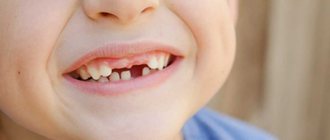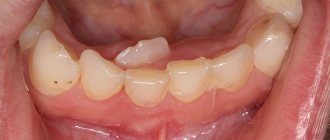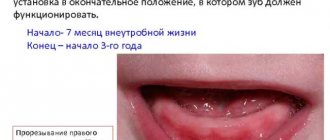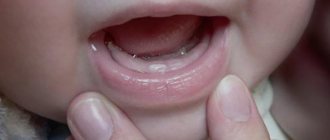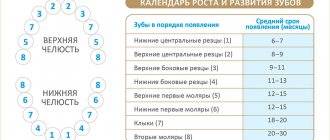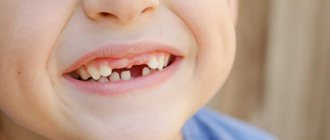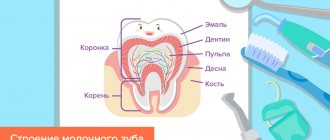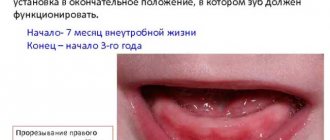Signs that your baby is teething
At the age of 3 to 8 months, the first symptoms associated with teething in children appear, these include:
- salivation increases;
- the child constantly puts hands or toys into his mouth;
- the gums swell and turn red;
- loss of appetite;
- the child cries a lot and behaves restlessly;
- the occurrence of vomiting, constipation or diarrhea;
- baby doesn't sleep well;
- cough and stuffy nose appears;
- diathesis develops.
Although teething in children under one year of age is a natural process, its symptoms resemble the development of some kind of disease. This is due to the fact that the tooth must break through the bone and gum before emerging.
Sleep and teething - what to do?
All parents know that teething is one of the most unpleasant events that can happen to their baby. Children become capricious, sleep poorly and put everything in their mouth. But parents often confuse poor sleep and the vagaries associated with it with teething. How to understand that your baby is teething and how to maintain good sleep?
Some sleep experts write in their books that teething does not harm sleep if the baby has already formed the right habits. But I can't agree with this. As with everything else, all children are different, and their pain sensitivity threshold is different. So I think it's our responsibility as parents to sympathize and try to help kids get through this difficult period, but at the same time make sure they get enough sleep.
What are the signs that your baby is teething?
- excessive salivation;
- runny nose;
- redness of the cheeks and/or rash on the chin, around the mouth;
- refusal of the breast/bottle or, conversely, the desire to breastfeed more often;
- strengthening of the sucking reflex;
- desire to bite/gnaw everything around;
- swollen, whitish gums;
- difficulty falling asleep and staying asleep;
- capriciousness, tearfulness.
Also, sometimes when teething, the temperature may rise, stool and frequency of urination may change. But if these symptoms occur, you need to be more careful, as they may indicate an infection. Therefore, if you have any suspicions, it is better to consult a doctor.
How to distinguish teething from just bad sleep?
In fact, this is a very difficult question. My baby, for example, never had swollen gums, fever or runny nose, and the desire to put everything in his mouth did not depend on teething. I usually discovered new teeth by accident. That is, just yesterday evening the gum looked as usual, but today a tooth is sticking out of it. How can you differentiate poor sleep due to teething from other causes of poor sleep? Here are the main points that parents need to remember:
1) The baby slept well, but now he sleeps very poorly. If you have ruled out all possible reasons for waking up and the baby is not sick, then it may be that his teeth have begun to bother him. If this is the case, look closely and you may be able to spot one or more of the symptoms listed above.
2) The baby feels unwell throughout the day. The discomfort from teething should not be confused with the evening whims that arise due to insufficient sleep during the day or going to bed late at night. Indeed, the baby may be more restless at night. But if he behaves very well during the day, and often wakes up at night, then the cause may not only be his teeth.
3) If you have ruled out all other causes of your baby’s anxiety, then you can give him a painkiller 15-20 minutes before bedtime (for example, Nurofen - 2.5 ml once), having previously discussed this with your pediatrician. If the baby is really worried about his teeth, then he will fall asleep better and will not wake up for at least 4 hours, or even all 5-6 (if at night), and during the day he will have a full sleep lasting 1.5-2 hours.
How long does teething take?
It can take 2 years from the first to the last tooth. But this does not mean that the baby will sleep poorly for the entire 2 years “because of teeth.” Very often, parents attribute poor sleep to teething. But in reality, teething itself lasts 2-5 days (molar teeth take longer to erupt). The rest of the poor sleep time is the result of bad habits that we, parents, unknowingly create.
How to help your baby?
Even though it is very difficult to relieve a baby's distress, we still need to make every effort to help him fall asleep and get enough sleep throughout the day and night.
Throughout the day, various teethers (pre-chilled in the refrigerator), a pacifier, special massage brushes, additional drinking of cool water, and additional breastfeeding can help. Teethers helped my baby, but I know many mothers who said that it didn’t help them at all. Try to experiment, and perhaps you will find something that suits your baby.
Nonsteroidal anti-inflammatory drugs (ibuprofen or paracetamol) are considered the most effective medications. Children's ibuprofen (=nurofen) is considered the gold standard, but some experts do not recommend it before 6 months. Therefore, before giving your baby one of these drugs, consult your pediatrician .
Freezing gels can also help. But they must be used very carefully, as they can have a fairly strong “freezing” effect, which can greatly frighten the child and he may become even more restless. Note! According to the latest data, it is not recommended to use pain-relieving gels that contain benzocaine (for example, Orajel), as they can be dangerous to your baby's health. (More about this here.)
Separately, I would like to say about homeopathic medicines. As is known, their effectiveness has not been proven. But the harm has also not been proven. Although mothers claim that their baby “helped a lot.”
Should I stop sleep training during teething?
There can be no clear answer here. If the baby is very unwell, his temperature has risen and he refuses to eat, you should pay him even more attention, take him in your arms, hug him, stay with him longer, even if this affects his sleep. But if the baby is simply “gnawing on his fists,” then you should not deviate from the planned plan. As I already wrote above, teeth erupt over the course of 2 years, but this does not mean that you need to suffer all these 2 years and wait for them to all erupt.
Natalya Domres, children's sleep consultant, neurologist and author of the Baby's Sleep project
Dear Parents! I sincerely wish your babies healthy teeth and good sleep. If you need help, you can always contact me for a consultation, and together we will help you and your baby get enough sleep!
Do you want to keep abreast of new articles and events of the Baby's Dream project? Sign up for the newsletter on the right side of the page!
What should parents be wary of?
Along with teething, an infection can join a weakened child’s body, so there are symptoms that require you to urgently show your baby to a doctor:
- if the child coughs very strongly and often with the release of a large amount of sputum, the cough is accompanied by wheezing and shortness of breath;
- when the baby has a profuse runny nose with the discharge of cloudy white or greenish mucus that does not go away for more than 3 days;
- the temperature during teething in children lasts more than 2 days, is not reduced by antipyretic drugs and is above 39 degrees;
- if diarrhea is very frequent and intense with mucus or blood;
- when constipation lasts more than 3 days.
In any case, if anxiety or unclear situations arise, it is better to consult a pediatrician. Since during this period the child’s immunity is weakened, he should be protected as much as possible from possible infection with infectious diseases, vaccinations and other medical procedures should be postponed.
Main symptoms of teething
At around six months, your baby's first baby tooth will emerge. Although it is impossible to predict the exact date of this exciting event, there are several (unfortunately, rather unpleasant) signs that the moment is close. The process is different for every baby, but most will experience some, if not all, of the following teething symptoms:
Swelling of the gums. Almost every child's gums swell to one degree or another. As a tooth begins to erupt, the surrounding soft tissues swell and become sensitive.
Salivation. It's amazing how much saliva can come out of such a small mouth! Teething almost always causes increased salivation, which sometimes begins several months before the first tooth appears.
Skin rashes. A small rash on your baby's cheeks or chin caused by excessive drooling should not be a cause for much concern. Try to wipe away drool as it appears, and if your baby's skin is already irritated, simply moisturize it until the rash goes away.
Pain. For some babies, teething involves a lot of pain, while for others everything seems to go smoothly and easily. And yet, in one way or another, almost every baby experiences pain, the signs of which are crying and irritability.
Irritability. Due to the discomfort caused by teething, your baby is likely to become fussy and excitable. Some people stay in this mood only for a short time, while for others it can persist for weeks as each tooth erupts.
Chewing. Children quickly learn that applying pressure to the gums reduces discomfort caused by teething. Be prepared for the fact that your baby will begin to put things in his mouth and chew on everything - from special teething rings to his own fingers.
Slight fever. Sometimes swollen gums can lead to an increase in temperature to 37.5–38 degrees. You can fight this kind of heat using the most common methods. If the temperature does not subside for more than three days or rises above 38 degrees, you should consult a doctor.
Loss of appetite. During teething, sucking can be painful for babies, making them reluctant to eat. Even children who have already begun to transition to solid foods can refuse to eat. If your baby starts missing more than two feedings in a row, consult your pediatrician.
Sleep problems. If your child experiences discomfort during the day, there is a high chance that he will also feel uncomfortable at night. During the teething period, babies often wake up during the night (even if they have been sleeping well all night for months before).
Diagram of teething in children
If we talk about the order of teething in children, then everything is clear. The very first to cut are the two central incisors from below; they can emerge either in pairs or one after another. Then the central upper incisors erupt. The next ones are two lower and two upper side ones. Most children over one year old have four front teeth on top and bottom.
After the incisors, the canines erupt, but they give way to the molars, so there will be temporary gaps in their place. Then the canines and remaining molars grow. By the age of three years, the total number of teeth, including incisors, canines and molars, becomes twenty. There are no exact dates, everything is individual, this number of teeth can already be in two years. They begin to grow from the age of three months; if we take an average, this happens at eight months. It is believed that if the first tooth erupts later, then the loss of baby teeth will begin later. It is important to know that before reaching the age of one, the baby must have at least one tooth, otherwise it is worth examining the child for the presence of rickets, hyperthyroidism and other diseases.
Often the first tooth grows in pairs, and this can happen with the others; it happens that 4 teeth are cut at once. Of course, in this case, the eruption time is reduced. The order in which teeth appear may also differ, but don’t worry, everything in this case is very individual and goes according to nature’s plan.
How to help your child when he is teething
Infants are very sensitive to the behavior of their parents, so it is important to remain calm and pay as much attention to the baby as possible: carry them in your arms, distract them with toys, avoid quarrels. Breastfed babies will more often ask for the breast as it calms them down, it is important not to deny him this. During the growth of the baby's teeth, it is recommended to give teethers, which are made of safe materials and can alleviate his condition. Or it can be any toy that does not have small parts that can be chewed off.
You can also help your child with the following medications:
- Dantinorm baby
is a homeopathic remedy in the form of a solution that has a calming effect and relieves discomfort. - Dentokid
is a homeopathic remedy that relieves all unpleasant symptoms, including eating disorders, runny nose and fever. - Kamistad Baby Gel
– has an anti-inflammatory, regenerating and antiseptic effect thanks to lidocaine and chamomile, recommended for children over three months old. - Cholisal gel
– has an analgesic, anti-inflammatory and antimicrobial effect; it must be used with caution, as an allergic reaction is possible.
During the period when a child’s teeth are growing, it is difficult for both the baby and his parents. Children's crying and restless behavior accompanies this inevitable process. You just need to go through this period, supporting the child as much as possible and perceiving this as another stage of growing up.
This article is for informational purposes only, please consult your doctor for details!
